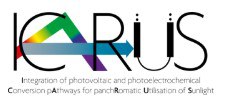ICARUS - Integration of photovoltaic and photoelectrochemical Conversion pAthways forpanchRomatic Utilisation of Sunlight
 The general objective of ICARUS is strategic to Europe’s ambition and long-term vision of becoming independent on fossil fuels while strengthening its leadership in renewable energy and hydrogen technologies. ICARUS aims at developing one of the next generation technologies that will represent the pillars of the clean energy transition targeted to achieve carbon neutrality by 2050.
The general objective of ICARUS is strategic to Europe’s ambition and long-term vision of becoming independent on fossil fuels while strengthening its leadership in renewable energy and hydrogen technologies. ICARUS aims at developing one of the next generation technologies that will represent the pillars of the clean energy transition targeted to achieve carbon neutrality by 2050.
The scientific aim of ICARUS is to boost the efficiency of solar energy conversion and the economic sustainability of green hydrogen through the simultaneous, synergic production of electric power and solar hydrogen, entirely from sunlight and water. This ambitious goal will be achieved through the smart integration of photoelectrochemical (PEC) water splitting and photovoltaic (PV) power generation, using a spectrum-splitting dichroic system to concentrate short-wavelength solar radiation onto the PEC reactor, while transmitting long-wavelength photons to the PV module. This approach guarantees a panchromatic use of sunlight with optimized spectral quantum efficiency. ICARUS will build a prototype to validate the technology in a relevant environment; the system will integrate hydrogen storage at near ambient conditions using a metal hydride reservoir.
The project will bring a pivotal contribution to the clean energy transition by addressing the topic of “Hybrid-RES solutions” in Call Module 03A, which focuses on electricity generation combined with clean energy carriers.
Project Relevance:
The integration of solar technologies for both electricity and hydrogen production not only ensures a clean energy output, in line with the topic “Hybrid-RES solutions” in Call Module 03A, but also exemplifies the versatility needed for a comprehensive transition. ICARUS brings the concept of personal power plant closer to reality for small- to medium-sized users, such as energy communities agricultural farms, warehouses for logistic distribution centres, and hydrogen refueling stations.
Project details
Scientific responsability: Stefano Caramori
Funding source: Clean Energy Transition Partnership (CETP)
Call: CETP Joint Call 2023
Start date: 01/11/2024 - end date: 31/10/2027
Total cost: 1.238.633,50 €
Contribution to UniFe: 124.993,75 €
Participants
- Alma Mater Studiorum Università di Bologna, Italy - Coordinator
- Università degli Studi di Ferrara, Italy
- Commissariat a l'Energie Atomique et aux Energies Alternatives, France
- Universidad Autónoma de Madrid, Spain
- Ben Gurion University, Israel
